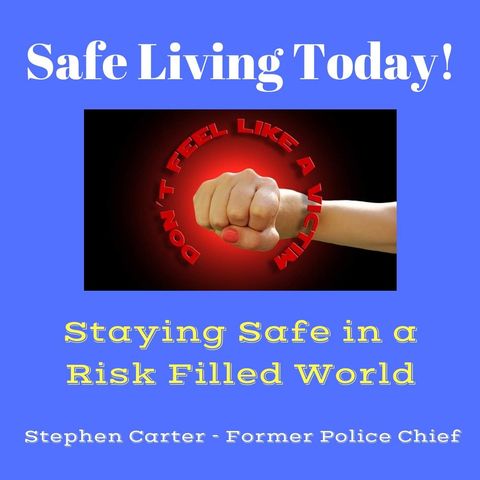Domestic Violence and How to Stay Safe

Download and listen anywhere
Download your favorite episodes and enjoy them, wherever you are! Sign up or log in now to access offline listening.
Description
October is National Domestic Violence Awareness Month. The scourge of domestic violence, also known as intimate partner violence, or IPV, is a world-wide problem. Abusers can be found among the...
show moreAbusers can be found among the rich, poor, and middle class. Abusers can be teenagers or in their 90s. Abuse is an equal opportunity crime committed by people who are black, white, latino, and from all other ethnic groups.
What is Domestic Abuse / Intimate Partner Violence?
The National Domestic Violence Hotline offers a simple and useful definition*:
"Domestic violence (also called intimate partner violence (IPV), domestic abuse or relationship abuse) is a pattern of behaviors used by one partner to maintain power and control over another partner in an intimate relationship."
These behaviors can include physical harm, creating fear, restricting a partner from doing what they choose, or forcing a partner to behave in ways they otherwise would reject. Examples of abuse are physical violence, threats and intimidation, sexual abuse, inflicting emotional pain, and financial deprivation. Any one of these acts is abusive.
How Prevalent is Domestic Abuse / IPV?
Here are a few sobering statistics provided by the National Domestic Violence Hotline**:
On average, 24 people per minute experience rape, physical violence or stalking by in intimate partner in the U.S. That’s more than 12 million women and men a year.
Approximately 25% of women and 14% of men 18 years old and older in the U.S. have been a victim of severe physical violence by a partner in their lifetime.
More than 1 in 3 women and 1 in 4 men in the U.S. have experienced rape, physical violence or stalking by an intimate partner in their lifetime.
Nearly half of all women and men in the U.S. have experience psychological aggression by a partner in their lifetime.
Most female victims of intimate partner violence were previously victimized by the same offender, including 77% of women ages 18 to 24,, 76% of females ages 24 to 34, and 81% of women ages 35 to 49.
Patterns of Abuse
Sadly, the statistics make clear abusive behavior typically gets worse over time. Some abusers will show contrition after a violent act, but that contrition is generally short lived. One common pattern is for an abuser to voice an apology, but then add something like,
“If only you wouldn’t do “X”, I wouldn’t be triggered.”
This tactic is designed to have the victim assume responsibility for the abuser’s behavior. Typically, it won’t be long before the abuser again acts out.
Alcohol, drugs, financial or other stress, and an abuser’s own history of being an abuse victim can all play a roll. Regardless of the reasons, victims need to understand that once a pattern of physical and emotional abuse is in place, it’s not likely to stop until the victimized partner takes action to make it stop.
Get Help
If you or a loved one is experiencing domestic / intimate partner abuse help is available:
First, if you are using your family computer or a cell phone that your partner has access to, make sure there is no tracking software on the device. Use a library computer or a friend’s phone or computer to search for help.
If you are assaulted, call police. In most states in the U.S., if there is any evidence of assault, police must arrest the suspected offender.
In the U.S., call the National Domestic Violence Hotline at 1-800-799-7233 or (TTY) 1-800-787-3224. The website is https://www.thehotline.org/. You can talk by phone or through online chat to get information with a trained, caring helper.
Search online for domestic abuse resources in your community. There may be temporary housing and / or counseling available at a domestic abuse shelter.
If you do move out, limit the number of people who know where you are to those with an absolute need to know. Some abusers are smooth talkers and can convince friends or family members to tell them where you are.
If an abuser is charged either by police or through you obtaining a warrant, show up to trial and testify. An abuser will voice deep sorrow and contrition in an attempt to get you to not testify. Don’t fall for the lie. Testify. Your life may depend on it.
Emotional First Aid
The emotional trauma from domestic / intimate partner violence can be deep and long-lasting. Applying the Emotional First Aid techniques available on our FREA website is a great place to start the recovery process.
Please explore the written and video demonstrated techniques under the various tabs on the FREA site. You’ll find the FREA website at https://www.FREA.support.
Stephen Carter
Stress Solutions, LLC | www.EFT-MD.com | Safe Living Today Podcast: http://SafeLivingToday.com
Stephen Carter is a former Chief of Police, Corporate Security Director and safely leader for one of the world's largest financial services companies. He is now the CEO of Stress Solutions, LLC, a company dedicated to helping people enhance physical and emotional wellbeing through stress mastery using mind-body methods. He is the host of the, "Safe Living Today" Internet radio show and podcast.
* Definition and Warning Signs: https://www.thehotline.org/is-this-abuse/abuse-defined/
** https://www.thehotline.org/resources/statistics/
Information
| Author | Stephen Carter |
| Organization | Stephen Carter |
| Website | - |
| Tags |
Copyright 2024 - Spreaker Inc. an iHeartMedia Company
